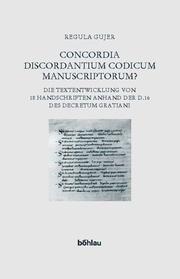| Listing 1 - 5 of 5 |
Sort by
|
Book
ISBN: 081320786X 9780813207865 Year: 1994 Publisher: Washington: Catholic university of America press,
Abstract | Keywords | Export | Availability | Bookmark
 Loading...
Loading...Choose an application
- Reference Manager
- EndNote
- RefWorks (Direct export to RefWorks)
348.15*501 --- Gratianus:decretum --- 348.15*501 Gratianus:decretum

ISBN: 3412129976 9783412129972 Year: 1998 Volume: 23 Publisher: Köln: Böhlau,
Abstract | Keywords | Export | Availability | Bookmark
 Loading...
Loading...Choose an application
- Reference Manager
- EndNote
- RefWorks (Direct export to RefWorks)
Canon law --- Gratian, --- 348.15*501 --- Gratianus:decretum --- 348.15*501 Gratianus:decretum --- Gratian --- Manuscripts --- Canon law - Sources --- Gratian, - active 12th century - Decretum
Book
ISBN: 9789042935464 9042935464 Year: 2018 Volume: 55 Publisher: Leuven: Spicilegium sacrum Lovaniense, Peeters,
Abstract | Keywords | Export | Availability | Bookmark
 Loading...
Loading...Choose an application
- Reference Manager
- EndNote
- RefWorks (Direct export to RefWorks)
The wish to avoid scandala or to put an end to scandalous situations has been and remains a continuous concern of canonists and Church authorities, at least as of the thirteenth century. As of Raymond of Penafort's Summa de paenitentia (late 1220s - early 1230s), scandalum was dealt with separately in canonical dictionaries. Legal historical research on the earlier use of the term within canon law, is however relatively scarce. Inspired by the linguistic-philosophical approach of the Begriffsgeschichte, this book offers a conceptual-historical analysis of the use of scandalum by early Bolognese decretists (ca. 1140 - ca. 1180) and in papal decretals from Alexander III (1159) until the promulgation of the Liber Extra by Gregory IX in 1234. For Gratian and the earliest generation of decretists (Paucapalea and Rolandus), scandalum was a quite insignificant notion. Gradually, with Rufinus, however, the concept gained importance, both quantitatively and qualitatively. Stephen of Tournai pointed at the horrible consequences of a scandalum for the salvation of the souls. Simon of Bisignano stressed, for instance, the opposition between scandalum and peace. Even though non of the twelfth- and early thirteenth-century sources had yet developed a consistent theory on scandalum and its legal consequences, the analysis of papal decretals shows how scandalum became a more popular concept, especially in the field of disciplinary and penal canon law. Some evidence even suggests an instrumentalism of the term by the end of the twelfth century. At the same time, increasingly popes, especially Innocent III (1), were aware of the ambivalent nature of the concept. Apart from scandalum's polysemy, the legal-political use of the term was striking: repression, reconciliation and cover-up policies could all be justified in order to avoid or to put an end to scandala, and, thus, to save one's soul and to protect the Church. This relatively open and flexible notion played an important part in the Church's peace policy as well. This study argues that scandalum can be described as 'indignation as a source of conflicts'.
Academic collection --- 348.15*501 --- 348.15*540 --- Kerkelijk recht --- Kerk & wereld --- 348.15*540 Gregorius ix:decretales --- Gregorius ix:decretales --- 348.15*501 Gratianus:decretum --- Gratianus:decretum --- Gratianus:decretum --- Gregorius ix:decretales
Book
ISSN: 05567378 ISBN: 9782204095273 2204095273 Year: 2011 Volume: 3 58/59 Publisher: Paris: Cerf,
Abstract | Keywords | Export | Availability | Bookmark
 Loading...
Loading...Choose an application
- Reference Manager
- EndNote
- RefWorks (Direct export to RefWorks)
Canon law --- Sacraments --- 348.412.7 --- 348.15*501 --- Marriage (Canon law) --- -Marriage (Canon law) --- Sacraments (Canon law) --- Canoniek zakenrecht: huwelijk--(canon 1012-1143) --- Gratianus:decretum --- History --- -Catholic Church --- Mariage --- Droit canonique --- Droit romain --- -Canoniek zakenrecht: huwelijk--(canon 1012-1143) --- -348.412.7 --- 348.15*501 Gratianus:decretum --- 348.412.7 Canoniek zakenrecht: huwelijk--(canon 1012-1143) --- -348.15*501 Gratianus:decretum --- Droit romain. --- -Sacraments --- -History --- -Mariage
Book
ISBN: 0813221692 9780813221694 9780813221687 0813221684 Year: 2014 Publisher: Washington, D.C.
Abstract | Keywords | Export | Availability | Bookmark
 Loading...
Loading...Choose an application
- Reference Manager
- EndNote
- RefWorks (Direct export to RefWorks)
Penance --- Penance (Canon law) --- Sacraments (Canon law) --- Attrition --- Contrition --- Church discipline --- Forgiveness of sin --- Sacraments --- Absolution --- Confession --- Repentance --- History of doctrines --- History --- Gratian, --- Tractatus de penitentia --- Penance (Canon law) - History - To 1500 --- Penance - History of doctrines - Middle Ages, 600-1500 --- Gratian, - active 12th century. - Tractatus de penitentia --- 348.15*501 --- 348.15*501 Gratianus:decretum --- Gratianus:decretum
| Listing 1 - 5 of 5 |
Sort by
|

 Search
Search Feedback
Feedback About UniCat
About UniCat  Help
Help News
News